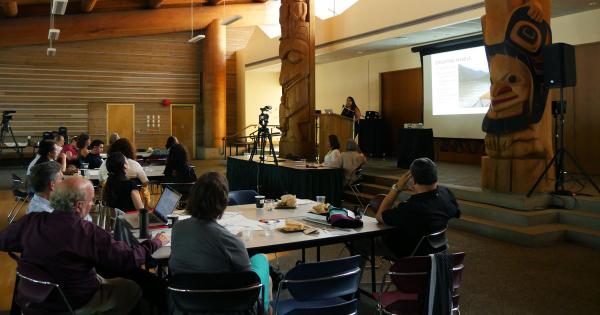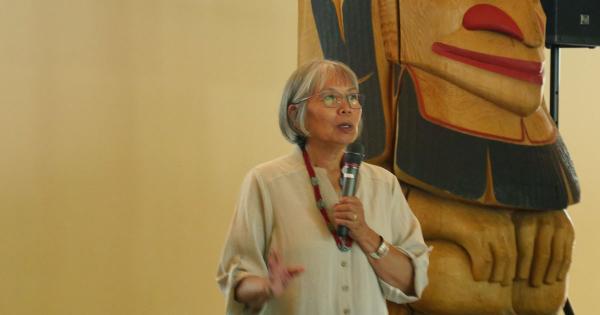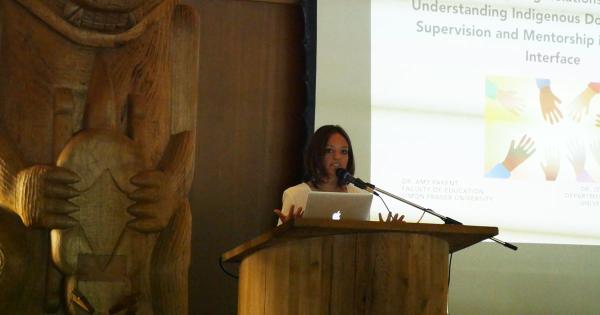On August 17th, 2017, approximately 75 UBC faculty, staff and students came together for a forum on Mentoring Indigenous Graduate Students at the First Nations House of Learning.
UBC has a stated commitment to Indigenous education and to respect Indigenous knowledge and cultures, as well as a resolution to build upon the strengths of the university to more fully address the needs of Indigenous communities in British Columbia, Canada, and the world.
In this forum, UBC acknowledged its responsibility to Indigenous graduate students, particularly in relation to UBC’s priorities for this next century. The participants addressed ways we might enact this responsibility across the institution by examining exemplars of success as well as key challenges.
Distinguished Professor Graham Hingangaroa Smith, (Te Whare Wānanga o Awanuiārangi), from New Zealand and Dr. Jo-Ann Archibald (Q’um Q’um Xiiem), member of the Stol:lo Nation and former Faculty of Education Associate Dean for Indigenous Education, were featured speakers.
Dr. Archibald provided an eloquent welcome to the Sty-Wet-Tan Great Hall and the teachings associated with the four Houseposts carved by Northwest Coast artists.
This welcome was followed by an opening statement by Dean Susan Porter who shared comments from President Ono acknowledging that UBC’s Point Grey Campus is situated on the traditional, ancestral, and unceded territory of the Musqueam people: “We are very cognizant of our debt to British Columbia’s Indigenous people. We recognize that in the past we have not lived up to our obligations. Efforts are underway at UBC to improve educational opportunities for Indigenous people, education about Indigenous issues, and collaborative research benefiting Indigenous communities. We are committed to extending and strengthening these efforts in the future…Mentorship of Indigenous graduate students is an important component of this and I commend all of you who are taking part in this forum today.”
Professor Graham Smith began his address by positioning himself as a Maori educator who has “blisters on his hands,” noting the importance of not only theorizing and sharing your work, but actually enacting it – as he has done as an influential scholar at several universities in New Zealand and Canada, and an international consultant.
Dr. Smith emphasized that a public institution has an obligation to make a difference in communities and to support students to become transforming agents. He asked how an institution can be world class if part of its population remains underserved.
Dr. Smith closed with a model for change at UBC that includes beginning with a critical understanding of the institution’s cultural context and addressing multiple levels of the university simultaneously.
Dr. Jo-Ann Archibald then led a panel that included Dr. Amy Parent of Simon Fraser University; and Andrea Lyall, PhD Student. Dr. Archibald shared her work as a co-founder of SAGE, Supporting Aboriginal Graduate Enhancement, a province-wide, inter-institutional, peer-support/faculty-mentoring educational program.
The SAGE program “supports Indigenous students to make significant educational and social change using research, Indigenous knowledge, and community oriented approaches.” Dr. Archibald has won several awards for her outstanding contribution to graduate education, including the UBC Killam Mentoring Award.
Dr. Amy Parent, Nox Ayaa Wilt, from the House of Ni’isjoohl in the Nisga’a nation shared significant research on the mentorship of Indigenous graduate students, highlighting the importance of institutional advocacy, Indigenous knowledge systems and methodologies, preparation and guides to the academic experience, and holistic supervision and career planning.
Andrea Lyall, (Quock-quock-KEE-wok), PhD candidate in Forestry, discussed both the challenges and successes for Indigenous graduate students, underscoring the need for community, Indigenous content, and institutional leaders who focus on diversity and inclusion.
The forum closed with audience dialogue and feedback. A working group then developed a list of recommendations during the Autumn of 2017, sharing them with various units on campus. These recommendations are wide-ranging and productive, and include increasing funding for Indigenous students; creating culturally sensitive recruitment tools; developing welcoming events and activities, drawing on the wisdom and support of Elders in the graduate school experience; expanding the SAGE model across campus; Indigenizing the curriculum; and developing guides to mentoring Indigenous students. Over the coming year, G+PS will work with partners across campus to review and address these and other potential strategies to enhance the Indigenous graduate student experience.
The Forum on Mentoring Indigenous Graduate Students was organized by Graduate and Postdoctoral Studies with support from the First Nations House of Learning, Supporting Aboriginal Graduate Enhancement (SAGE), the Teaching and Learning Enhancement Fund, and the Equity Enhancement Fund. For more information, contact theresa.rogers@ubc.ca.


